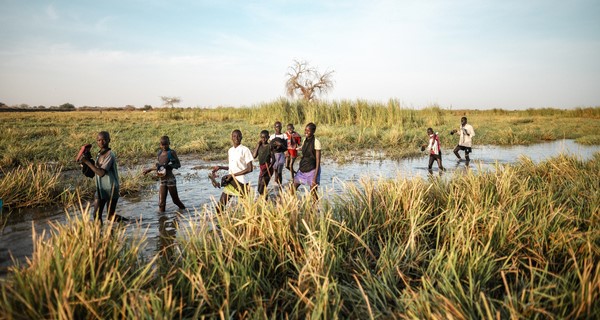The commissioner of Fangak County in South Sudan’s Jonglei State appealed Wednesday for urgent food aid for residents trapped in ongoing clashes between government forces and armed youth, warning that the humanitarian situation is deteriorating as livelihoods collapse.
Since early this year, repeated violence involving the South Sudan People’s Defense Forces (SSPDF) and the White Army militia has turned Fangak—a flood-ravaged region on Jonglei’s northern edge—into a battleground of sporadic clashes.
County Commissioner Johnson Kuol Gach told Radio Tamazuj that the conflict has destroyed vital food sources and left civilians without basic services.
“Fangak County has been affected by flooding over the past five years with no cultivation. The food and health situation has been worst, and with the fighting last month, civilians were displaced to swampy areas, destroying the coping mechanism,” Kuol said. “People are really suffering, only depending on wild plants and fish.”
Kuol claimed that aerial bombardments have been restricted to rebel hideouts, allowing some displaced civilians to return home.
“On Sunday, about 85 women and elderly returned from swamps and were welcomed by the SSPDF and were given food. The following day, 50 more returned,” he said. “Some of those returnees were badly malnourished, unable to go back to their villages, so they were accommodated by the army.”
He added that the situation had remained calm for over a week, with no bombardments reported until Sunday, when gunships targeted SPLA-IO forces regrouping near Kuerpan.
“Civilians are not the target, but rebels intending to attack. So we urge the civilian population to return home to get food,” Kuol said. “We also urge humanitarian agencies to intervene.”
However, several residents refused to return, citing lingering danger.
Gatluak Golong, a New Fangak resident, said he fears being targeted.
“It was only on Sunday that the village of Kuerkan was targeted, so we cannot return to an area targeting civilians,” he said. “Indeed, we are suffering, and we cannot go to army headquarters because we were labeled as hostile.”
Another resident, Nyagoa Chuol Joak, described dire conditions.
“We lack food, with everyone malnourished. Some people even die from hunger,” Joak said. “There is no food, and we cannot go to the army to get food because we are being targeted by gunships.”




